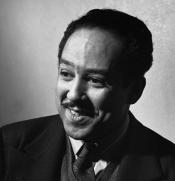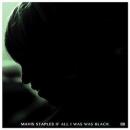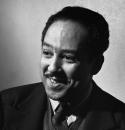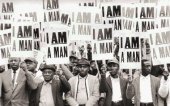I pick up my life
And take it with me
And I put it down in
Chicago, Detroit,
Buffalo, Scranton,
Any place that is North and East—
And not Dixie.
I pick up my life
And take it on the train
To Los Angeles, Bakersfield,
Seattle, Oakland, Salt Lake,
Any place that is
North and West—
And not South.
I am fed up
With Jim Crow laws,
People who are cruel
And afraid,
Who lynch and run,
Who are scared of me
And me of them.
I pick up my life
And take it away
On a one-way ticket—
Gone up North,
Gone out West,
Gone!
And take it with me
And I put it down in
Chicago, Detroit,
Buffalo, Scranton,
Any place that is North and East—
And not Dixie.
I pick up my life
And take it on the train
To Los Angeles, Bakersfield,
Seattle, Oakland, Salt Lake,
Any place that is
North and West—
And not South.
I am fed up
With Jim Crow laws,
People who are cruel
And afraid,
Who lynch and run,
Who are scared of me
And me of them.
I pick up my life
And take it away
On a one-way ticket—
Gone up North,
Gone out West,
Gone!
Contributed by Pluck - 2023/7/26 - 00:31
Note adattate dal saggio di Adriano Elia (Università di Roma "Roma Tre") “NOT SOUTH”: THE GREAT MIGRATION IN LANGSTON HUGHES’ “ONE-WAY TICKET”
Le Simplegadi Vol. XVI No. 18 Novembre 2018 Pag. 117,118,119
As in typical blues songs, “One-Way Ticket” gives us an effective account of the sufferings not of an individual, but of a whole people: I pick up my life And take it with me And I put it down in Chicago, Detroit, Buffalo, Scranton, Any place that is North and East – And not Dixie.
In the opening stanza, the first-person singular pronouns ‘I’ and ‘me’ are not personal, but Whitmanesque *, that is, universal and inclusive. The narrator is forced to ‘pick up’ and ‘take’ his life elsewhere, anywhere but South, both metaphor for racism and discrimination and its geographical nucleus. Using the medium of an informal talk recalling the style of Robert Frost , although in a different rhythm and linguistic register, Hughes manages to convey the drama and the uncertainties of this one-way northbound journey away from Dixieland, that is, the southern states that joined the Confederacy during the Civil War.
The second stanza unveils the possibility of a better future that is geographically located anywhere but South: I pick up my life And take it on the train To Los Angeles, Bakersfield, Seattle, Oakland, Salt Lake, Any place that is North and West – And not South.
The third stanza illustrates the reasons for leaving – Jim Crow laws, lynching, prejudices, racial abuse. The South therefore becomes a marker of oppression and prevarication. It is described as a dark place where: I am fed up With Jim Crow laws, People who are cruel And afraid, Who lynch and run, Who are scared of me And me of them. The practice of discriminating against and segregating black people, even lynching them without legal process, was later effectively described by James Baldwin in The Fire Next Time (Baldwin 1963: 66): “The Negro’s past, of rope, fire, torture, castration, infanticide, rape; death and humiliation; fear by day and night, fear as deep as the marrow of the bone; […] this endless struggle to achieve and reveal and confirm a human authority, yet contains, for all its horror, something very beautiful”. Baldwin’s final note of optimism underlines the possibility of a redemption through art and beauty, that is precisely what Hughes and other poets, writers and artists of the Harlem Renaissance were striving to achieve.
The final stanza reinforces the message expressed at the beginning of the poem. The narrator ‘picks up’ the only ‘thing’ left to him, that is, his life, and cannot do anything but take it anywhere but South, away from racism and poverty: I pick up my life And take it away On a one-way ticket – Gone up North, Gone out West, Gone! Ultimately, buying a one-way ticket may be seen as a metaphorical gesture implying courage and assertiveness, a strong political act against the status quo. On several occasions, Hughes himself bought a one-way ticket, spending months travelling to West Africa and Europe.
*Whitmanesque:(Whitman + -esque ) = caratteristico del poeta Americano Walter Whitman. (1819–1892 ).
da Wiktionary
Le Simplegadi Vol. XVI No. 18 Novembre 2018 Pag. 117,118,119
As in typical blues songs, “One-Way Ticket” gives us an effective account of the sufferings not of an individual, but of a whole people: I pick up my life And take it with me And I put it down in Chicago, Detroit, Buffalo, Scranton, Any place that is North and East – And not Dixie.
In the opening stanza, the first-person singular pronouns ‘I’ and ‘me’ are not personal, but Whitmanesque *, that is, universal and inclusive. The narrator is forced to ‘pick up’ and ‘take’ his life elsewhere, anywhere but South, both metaphor for racism and discrimination and its geographical nucleus. Using the medium of an informal talk recalling the style of Robert Frost , although in a different rhythm and linguistic register, Hughes manages to convey the drama and the uncertainties of this one-way northbound journey away from Dixieland, that is, the southern states that joined the Confederacy during the Civil War.
The second stanza unveils the possibility of a better future that is geographically located anywhere but South: I pick up my life And take it on the train To Los Angeles, Bakersfield, Seattle, Oakland, Salt Lake, Any place that is North and West – And not South.
The third stanza illustrates the reasons for leaving – Jim Crow laws, lynching, prejudices, racial abuse. The South therefore becomes a marker of oppression and prevarication. It is described as a dark place where: I am fed up With Jim Crow laws, People who are cruel And afraid, Who lynch and run, Who are scared of me And me of them. The practice of discriminating against and segregating black people, even lynching them without legal process, was later effectively described by James Baldwin in The Fire Next Time (Baldwin 1963: 66): “The Negro’s past, of rope, fire, torture, castration, infanticide, rape; death and humiliation; fear by day and night, fear as deep as the marrow of the bone; […] this endless struggle to achieve and reveal and confirm a human authority, yet contains, for all its horror, something very beautiful”. Baldwin’s final note of optimism underlines the possibility of a redemption through art and beauty, that is precisely what Hughes and other poets, writers and artists of the Harlem Renaissance were striving to achieve.
The final stanza reinforces the message expressed at the beginning of the poem. The narrator ‘picks up’ the only ‘thing’ left to him, that is, his life, and cannot do anything but take it anywhere but South, away from racism and poverty: I pick up my life And take it away On a one-way ticket – Gone up North, Gone out West, Gone! Ultimately, buying a one-way ticket may be seen as a metaphorical gesture implying courage and assertiveness, a strong political act against the status quo. On several occasions, Hughes himself bought a one-way ticket, spending months travelling to West Africa and Europe.
*Whitmanesque:(Whitman + -esque ) = caratteristico del poeta Americano Walter Whitman. (1819–1892 ).
da Wiktionary
Pluck - 2023/7/27 - 13:12
×
![]()
Note for non-Italian users: Sorry, though the interface of this website is translated into English, most commentaries and biographies are in Italian and/or in other languages like French, German, Spanish, Russian etc.









By Langston Hughes ( 1901 - 1967 )
© 2023 The Ohio State University - University Libraries
The Great Migration and Lynching